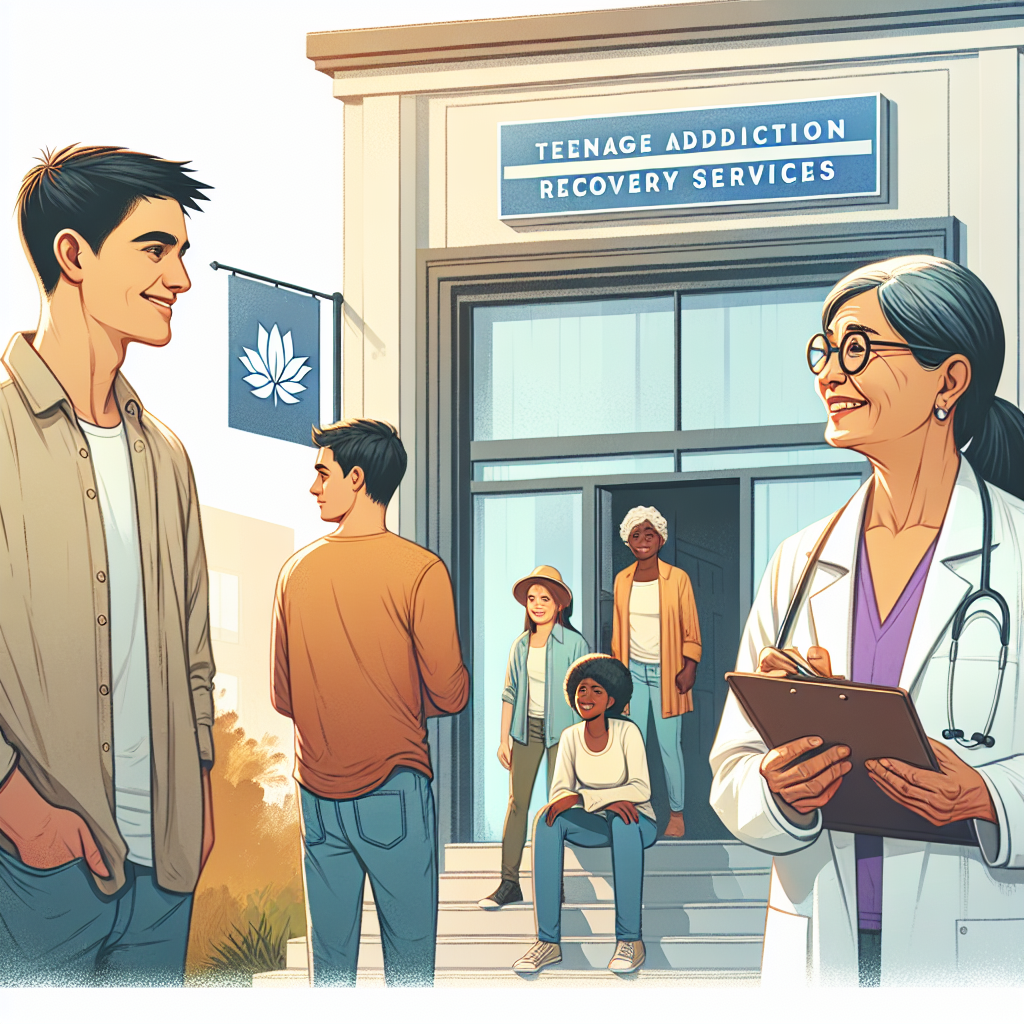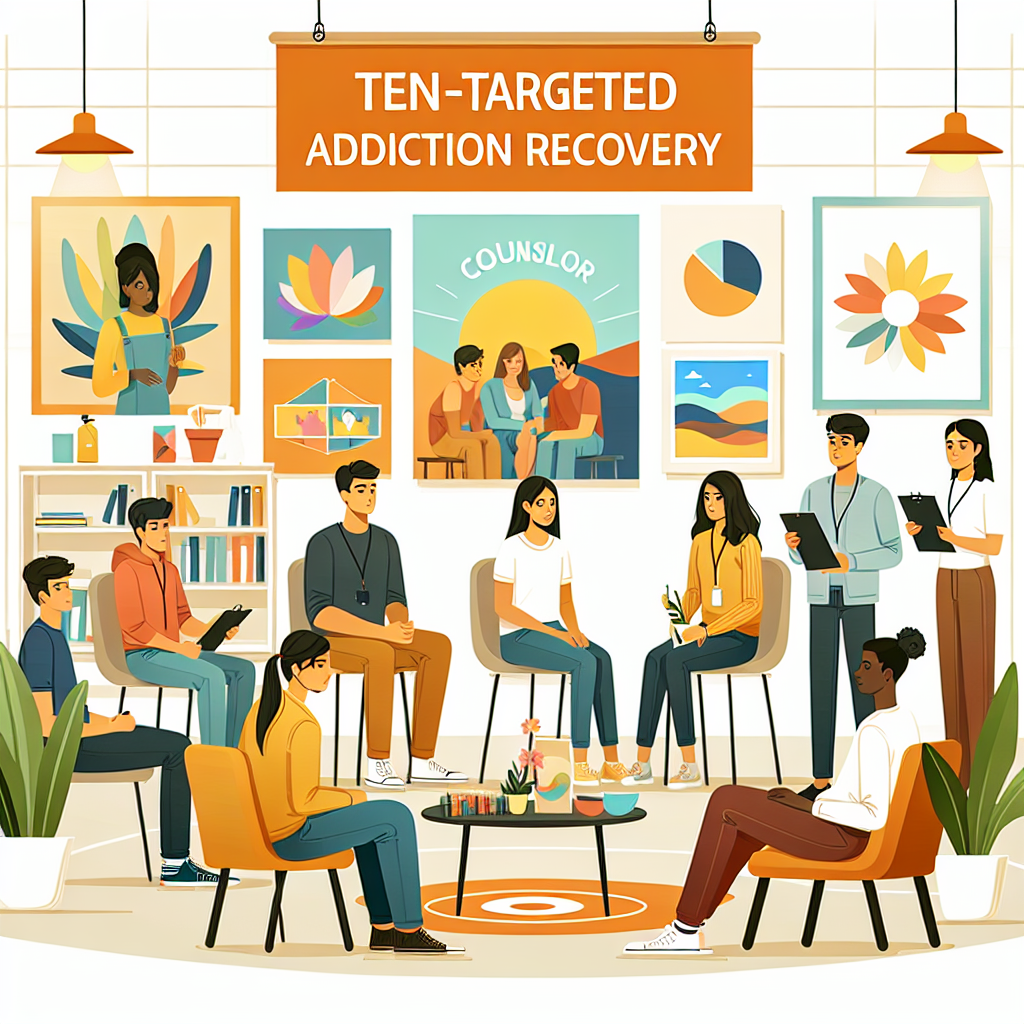-
Table of Contents

“Empowering Teens: Specialized Addiction Recovery Services for a Brighter Future”
Introduction
Addiction recovery services specifically for teenagers are specialized programs designed to address the unique needs of adolescents struggling with substance abuse. These services recognize that teenagers face different challenges and developmental stages compared to adults, necessitating tailored approaches to treatment. Programs often incorporate a combination of individual therapy, group counseling, family involvement, educational support, and recreational activities to foster a holistic recovery environment. By focusing on the specific psychological, social, and emotional needs of teenagers, these services aim to provide effective support and promote long-term recovery and well-being.
Effective Addiction Recovery Services Tailored for Teenagers
Addiction recovery services tailored specifically for teenagers are not only available but are also essential in addressing the unique challenges faced by this age group. Adolescence is a critical period of development, marked by significant physical, emotional, and psychological changes. During this time, teenagers are particularly vulnerable to substance abuse and addiction, which can have long-lasting effects on their health, education, and overall well-being. Recognizing the distinct needs of teenagers, many recovery programs have been designed to provide age-appropriate support and interventions.
One of the key aspects of effective addiction recovery services for teenagers is the incorporation of family involvement. Adolescents are still heavily influenced by their family environment, and involving parents or guardians in the recovery process can significantly enhance the chances of success. Family therapy sessions can help address underlying issues, improve communication, and rebuild trust, creating a supportive home environment that fosters recovery. Additionally, educating family members about addiction and recovery can empower them to provide the necessary support and encouragement.
Another crucial element is the focus on education and academic support. Addiction can severely disrupt a teenager’s education, leading to poor academic performance and increased dropout rates. Recovery programs that integrate educational support, such as tutoring and academic counseling, can help teenagers catch up on missed schoolwork and develop effective study habits. By prioritizing education, these programs ensure that teenagers do not fall behind academically, which is vital for their future prospects and self-esteem.
Peer support is also a fundamental component of addiction recovery services for teenagers. Adolescents often rely heavily on their peer group for validation and support. Recovery programs that facilitate peer support groups create a safe space where teenagers can share their experiences, challenges, and successes with others who understand what they are going through. These groups foster a sense of belonging and reduce feelings of isolation, which can be particularly beneficial during the recovery process. Moreover, positive peer influence can encourage teenagers to stay committed to their recovery goals.
In addition to these elements, addiction recovery services for teenagers often incorporate holistic approaches that address the physical, emotional, and psychological aspects of addiction. Activities such as art therapy, music therapy, and outdoor adventures can provide healthy outlets for self-expression and stress relief. These activities not only promote overall well-being but also help teenagers develop new interests and hobbies that can replace substance use. Furthermore, teaching coping skills and stress management techniques equips teenagers with the tools they need to navigate life’s challenges without resorting to substance abuse.
It is also important to recognize the role of mental health in addiction recovery for teenagers. Many adolescents struggling with addiction also face co-occurring mental health disorders, such as depression, anxiety, or trauma. Comprehensive recovery programs that offer integrated treatment for both addiction and mental health issues can address the root causes of substance abuse and provide a more holistic approach to recovery. Access to individual counseling, psychiatric care, and medication management can significantly improve outcomes for teenagers with dual diagnoses.
In conclusion, addiction recovery services specifically tailored for teenagers are vital in addressing the unique challenges faced by this age group. By incorporating family involvement, educational support, peer support, holistic approaches, and mental health care, these programs provide a comprehensive and effective framework for recovery. With the right support and interventions, teenagers can overcome addiction, build resilience, and achieve their full potential, paving the way for a healthier and brighter future.
Teen-Focused Addiction Recovery Programs: What You Need to Know
Teenagers facing addiction often find themselves in a unique and challenging position. Unlike adults, they are still in the critical stages of emotional, psychological, and social development. This makes it essential to have addiction recovery services specifically tailored to their needs. Fortunately, there are numerous teen-focused addiction recovery programs designed to address these unique challenges and provide the necessary support for young individuals on their path to recovery.
One of the primary reasons teen-focused addiction recovery programs are so vital is that teenagers often struggle with different issues compared to adults. Peer pressure, academic stress, and family dynamics can all play significant roles in a teenager’s life, potentially contributing to substance abuse. These programs recognize the importance of addressing these underlying factors and offer a holistic approach to treatment. By doing so, they not only help teenagers overcome addiction but also equip them with the tools to navigate the complexities of adolescence.
Moreover, teen-focused addiction recovery programs often incorporate educational components that are crucial for young individuals. These programs understand that teenagers are still in the process of forming their identities and making important life decisions. Therefore, they provide education on the effects of substance abuse, healthy coping mechanisms, and the importance of making positive choices. This educational aspect empowers teenagers to make informed decisions and build a foundation for a healthier future.
In addition to education, these programs emphasize the importance of a supportive community. Teenagers benefit greatly from connecting with peers who are going through similar experiences. Group therapy sessions and peer support groups create a sense of belonging and reduce feelings of isolation. This sense of community can be incredibly motivating, as teenagers realize they are not alone in their struggles and can draw strength from one another.
Furthermore, family involvement is a cornerstone of many teen-focused addiction recovery programs. Family dynamics can significantly impact a teenager’s recovery journey, and involving family members in the process can lead to more positive outcomes. Family therapy sessions help improve communication, rebuild trust, and create a supportive home environment. When families work together towards recovery, it fosters a sense of unity and reinforces the teenager’s commitment to sobriety.
Another essential aspect of these programs is the focus on mental health. Many teenagers struggling with addiction also face co-occurring mental health disorders such as depression, anxiety, or trauma. Teen-focused addiction recovery programs recognize the importance of addressing these issues simultaneously. By providing integrated treatment for both addiction and mental health, these programs ensure that teenagers receive comprehensive care that addresses the root causes of their struggles.
Additionally, these programs often incorporate experiential therapies that resonate with teenagers. Activities such as art therapy, music therapy, and outdoor adventures provide alternative ways for teenagers to express themselves and process their emotions. These experiential therapies can be particularly effective in helping teenagers develop healthy coping mechanisms and discover new interests and passions.
In conclusion, teen-focused addiction recovery programs play a crucial role in helping young individuals overcome addiction and build a brighter future. By addressing the unique challenges teenagers face, providing education, fostering a supportive community, involving families, and focusing on mental health, these programs offer a comprehensive and holistic approach to recovery. For teenagers struggling with addiction, these specialized services provide the guidance, support, and inspiration needed to embark on a journey of healing and transformation.
Q&A
1. Are there addiction recovery services specifically for teenagers?
Yes, there are addiction recovery services specifically designed for teenagers, including specialized rehab centers, outpatient programs, and counseling services that address the unique needs of adolescents.
2. What types of addiction recovery services are available for teenagers?
Types of addiction recovery services for teenagers include inpatient rehabilitation, outpatient treatment programs, individual and group therapy, family counseling, and educational support programs.
Conclusion
Yes, there are addiction recovery services specifically designed for teenagers. These services often include specialized counseling, therapy, and support groups tailored to the unique developmental and social needs of adolescents. Programs may also involve family therapy and educational components to address the broader context of a teenager’s life. The goal is to provide age-appropriate treatment that effectively supports teenagers in overcoming addiction and building a healthy future.



